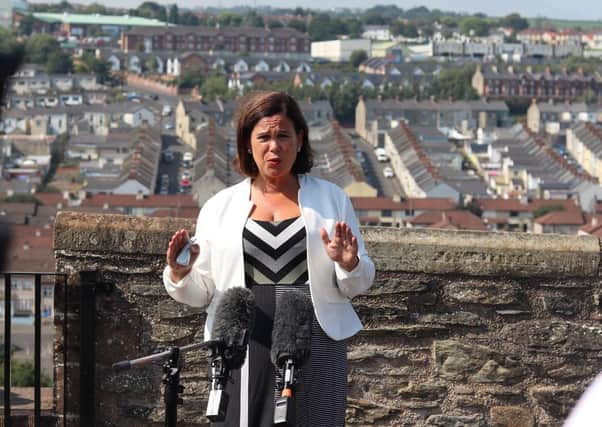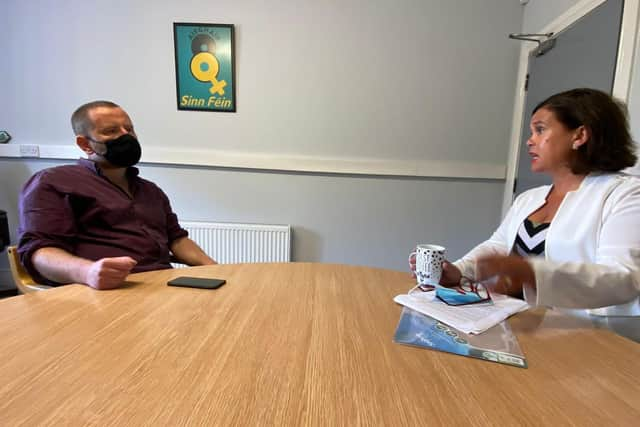Mary Lou McDonald in Derry : ‘The eastern seaboard has taken advantage. We need to change that’


The woman who would be Taoiseach and narrowly missed out on the role after the 2020 general election says change needs to happen now.
The Sinn Féin President was in Derry on Thursday for discussions with the Chamber of Commerce and to meet local party activists in the city.
Advertisement
Hide AdAdvertisement
Hide AdIn a wide-ranging interview with the ‘Journal’ she discussed the economic development of the north west, the state of the Stormont Assembly, and the onward journey to reunification which she believes is now nearing its end.


“I’m here in Derry, I suppose, to reconnect with people. I’m very conscious that we have been through and are still going through the whole COVID scenario so my movements have been limited, no more than anyone else. I’m going to meet with the Chamber of Commerce later and I will also meet with party activists,” she told the ‘Journal.’
On her way to Derry, Deputy McDonald was delayed near Dungiven by the ongoing construction of the A6 around Dungiven.
“You see that’s why we needed the A6 and we need the A5,” Martina Anderson said, as she welcome the Dublin Central T.D. to Sinn Féin’s constituency office on Eastway.
Advertisement
Hide AdAdvertisement
Hide AdDeputy McDonald agreed that Derry and Donegal are hugely dependent on the completion of a series of major infrastructure projects if our economic prospects are to improve.
“I think what we need is a joined-up, cross-border, holistic regional approach. I’m not saying anything new. I’m not breaking any new bread.
“It’s obvious that that’s what is needed. I’m very struck by the fact that the councils in Donegal, Derry and Strabane have had a very good working relationship and at that level there is a very clear realisation that you have to join the dots and work together.
“I don’t believe that has translated to higher levels of government and I think there’s a challenge for us in that now.”
Advertisement
Hide AdAdvertisement
Hide AdDerry and Donegal continue to post among the worst economic and health indicators on the island, and in some cases in western Europe. This is something the Sinn Féin leader is acutely cognizant of. High unemployment and lower life expectancies among poorer citizens are not tolerable on either side of the border, she says.
“I know if you were to talk to Pearse Doherty or Pádraig Mac Lochlainn who, as you know represent Donegal, they are as frustrated as representatives and people on the ground here in Derry so we need a joined-up approach. I think the government in Dublin and the Dáil and all of us have a role to play in facilitating a plan, a thoughtful plan, a long term plan for the entire region.”
She said that includes a major investment in third level education in the north west city region.
“I think it’s really exciting that there has been investment in Magee and I know we’ve had the first intake of medical students. But I think that we need to think big and we need to create hubs of education and innovation to drive things forward.
Advertisement
Hide AdAdvertisement
Hide Ad“When we get this right we’ll get it very right by the way. The potential in the region is huge. It’s just that the eastern seaboard, and I can say this living in Dublin, has taken priority and advantage and the west has been left behind. We need to change that.”
Turning to Sinn Féin’s principal mission and raison d’être, Deputy McDonald said there is real momentum behind the campaign for a United Ireland.
She believes Ireland is on the cusp of a momentous decade and that while as a republican she has clear ideas about how a reunified island might look, she wants others to get involved in the conversation. Neither she nor Sinn Féin wish to be prescriptive in any way, she says.
“I can hardly call for an inclusive debate and start excluding people or ideas. We will bring our ideas. We are republicans. We want an Ireland that is absolutely about public provision, that is about equality of opportunity, that is about shared prosperity, all of those things. I think we have common cause with lots of people on that, our unionist friends too, and others, people from ethnic backgrounds and so on. Everybody has to have a place at this.
Advertisement
Hide AdAdvertisement
Hide Ad“When I say everything needs to be on the table I sincerely mean that. I’m very conscious that in the reunification scenario we are not starting from ground zero. In the Good Friday Agreement, on matters of identity, a human rights framework and platform, all of those are settled matters.
“We have settled and agreed that the people of our island are and can be Irish, British or both. We’ve settled the matter that equality imperatives have to be at the heart of our politics, that a human rights framework is absolutely essential, those are settled matters and those are good foundations to build on.
Deputy McDonald has previously suggested a Stormont Assembly may continue to play a role in a United Ireland.
The ‘Journal’ asked if the old Éire Nua proposal for four provincial assemblies in Ulster, Munster, Connaught and Leinster with a capital relocated to Athlone might be a runner.
Advertisement
Hide AdAdvertisement
Hide AdShe said everything should be on the table but as a proud Dub baulked at the idea of a new capital on the Shannon.
She joked that she has been ‘shocked and traumatised’ enough by Dublin’s recent defeat to Mayo in the All-Ireland Senior Football Championship semi-final.
On a more serious note she said that while new structures of governance would have to be discussed in the event of Irish unity, there was a danger of over-administering a small island with a population of just 7 million people.
“The infrastructure of government, the Assembly in the north on a transitional or a permanent basis? I think all of those things need to be debated out. But it also has to be couched in the reality that we are a small island. It’s a small island community. We don’t want to over egg it in overly complicated or onerous structures.”
Advertisement
Hide AdAdvertisement
Hide AdThe leader of the opposition in the south acknowledged unionist anxieties over the prospect of imminent reunification are real. However, she insists they have nothing to fear.
“All of us have so much to win. The reality is, and we’re not arguing about grafting six counties on to 26 and we all carry on as things were. We are arguing for something transformational and something that is agreed and something that is progressive.
“I don’t want a 32 county Free State. I want a united, a free, a fair and an equal Ireland and there is work to be done to make that happen. We have to look at everything and the constitutional framework and the constitutional arrangements, what that looks like is a whole debate in itself.
“Here is the point. I’m not going to set myself up as the oracle, that I’m going to hand down on tablets of stone - this is how it is. That’s not how this works. This is national project and each and every one of us has to start now.
Advertisement
Hide AdAdvertisement
Hide Ad“I’ve said this to Micheál Martin, just as I said it to Leo Varadkar before, that it is my strong view that the failure to actively prepare and actively engage on the issue of a referendum, on the issue of Irish reunification and all that that entails, I think verges on recklessness because there is no doubt there will be a referendum.
“It’s not a question of if, it is a question of when and what we have to work together towards is that we have a peaceful, an orderly and a democratic transition and that means preparation.”
She praised Derry human rights and legal expert, Professor Colin Harvey, for his consistent calls for urgent preparations for constitutional change.
“I think Colin Harvey has made a really, really thoughtful and challenging contribution to this debate and I think he and others are ahead of the curve. He’s part of the Ireland’s Future group and there are others. They are making a lot of sense and they are calling out the reality, that political change is under way and any political leader who would choose to bury their head in the sand or pretend that this isn’t happened or that you can delay it with a mañana, mañana approach, I think, is making a big mistake. To use as an excuse or a rationale for this concerns around unionist sensitivities, to me makes no sense. The mature and respectful thing is to engage isn’t it? The respectful and the grown up and the real thing to do is to create the space for this conversation, for this planning and to invite every and all views and persuasions to that table and Dublin needs to get cracking on that.”
Advertisement
Hide AdAdvertisement
Hide AdAs for Stormont, she is insistent that is must work and be seen to work for the people of Derry. Prior to the summer recess it appeared at times as though internal unionist intrigue and infighting over the Protocol were about to capsize the Assembly. Deputy McDonald said unionists and the British government need to start dealing with reality.
“The Protocol isn’t going away. Any of this codology that the Protocol can be wished away is not dealing with the reality. The reality is Brexit happened and the reality is the interests of the island of Ireland had to be protected. That’s just the factual position. And, by the way, Boris Johnson’s administration signed off on that so whatever the challenges are the joint committee can deal with it but the Protocol isn’t going anywhere.
“As to the Stormont administration itself, I think it is very important that people see an administration and political leaders who are willing to work on the people’s behalf. It would be absolutely unthinkable that the institutions would collapse on the basis of a Protocol that has been negotiated painstakingly and signed off on by the British government and the EU institutions. That’s kind of nonsense-land. I don’t envisage that happening. We are very much up for working the institutions in a spirit of partnership and delivery for all of the people. I can only hope that the DUP - but also all of the other parties because bear in mind it’s a five party Executive - all of the parties around the Executive table, similarly have that sense of purpose.
“COVID has been devastating for people in so many ways and we need to lead from the front and create space for people to get back to work, to rebuild their lives, to get society up and move away and chart the way ahead. We need to look to the future. We need to look forward.”